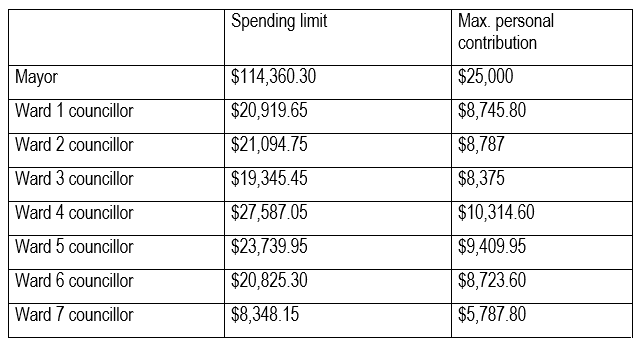
The real answer? It depends.
It depends on where you are running, who you’re competing against and whether you actually want to win.
Money can’t buy you everything, of course. And to stop you from trying, election legislation puts a spending cap on those running for office.
Still, a realistic run for most council seats will likely cost in the neighbourhood of $15,000.
A serious run for the mayor’s job probably demands spending up to the permitted $114,360.30 expense cap.
Of course, not all that cash can come from your pocket. There are limits on the amount that candidates can spend personally (see chart below), which means you’ll need to have – or find – some friends.
Looking back at the financial statements for Oakville candidates in the 2018 municipal election offers some interesting insights.
Name recognition
There’s a reason politicians spend so much on signs. Name recognition is important in any election but crucial in municipal campaigns where voters can’t just mark an x beside their favourite political party.
That means sitting politicians have a substantial advantage. They’ve spent the last four years cutting ribbons, sending out newsletters and solving constituent problems.
Across Ontario, more than three-quarters (76.5%) of incumbents who ran for the same office in 2018 were re-elected, according to an analysis by the Association of Municipalities of Ontario (AMO)
The odds were even better in Oakville, where every councillor seeking re-election was successful. Four of the 14 councillors were acclaimed to the job when nobody stood against them.
Name recognition has value
Allan Elgar, who has sat as Ward 4 town and regional councillor since 2000, spent $7,161 -- or only $1.17 per vote -- to earn 73 per cent of his ward’s votes in the last election.
Second-place finisher Rob Cottingham spent nearly $700 more but earned only 13 per cent of the votes.
And it lasts…
It cost veteran Ward 5 town and regional councillor Jeff Knoll more than $23,000 to ward off a challenge from former Oakville mayor Ann Mulvale, who still carries considerable name recognition despite being out of power since 2006.
Knoll was the biggest spender among council winners, doling out nearly $10,000 just for brochures and flyers.
Mulvale spent only $9,325 on her campaign, including just over $4,000 on brochures and flyers.
But sometimes you can’t count on it…
Fraser Damoff spent only $4,205 in the race for the Ward 2 town councillor seat, presumably counting on some recognition for the Damoff name. His mother Pam held the job from 2010 until 2015 when she jumped into federal politics.
It wasn’t enough to win him the seat.
Ray Chisholm, who captured the seat in a 2016 byelection after Pam’s departure, spent $12,458 to beat out Fraser with 54 per cent of the vote.
And sometimes you can’t even understand it…
When it comes to name recognition, Gary Carr may have as much as you can get at the municipal level. After a brief stint as a professional hockey player, he’s spent the last three decades moving from one political job to another. First elected as a provincial politician, he then jumped to federal politics before winning the job as Halton regional chair in 2006.
In the 2018 election, Carr spent $525 to get re-elected for his fourth term.
That’s right -- $525 of the more than $312,000 he was allowed to spend. His declared spending was for phone service, bank charges and some postcards he had left from the 2014 election.
But his opponent Anne Marsden was nearly as frugal. A perennial but fringe candidate, Marsden spent only $715.
With no money in play, presumably the race should have been decided solely on the name recognition of a career politician versus a candidate who has never held political office.
Carr did win his seat handily, earning roughly two-thirds of the nearly 121,000 votes across the region.
Still, more than 41,000 voters – including 12,439 in Oakville – cast their ballot for Marsden.
While he hasn’t yet registered, Carr has said he’ll run again in October. He’ll undoubtedly have to spend some real cash in this election as he faces off against two Burlington politicians – former Tory MPP Jane McKenna and current Halton District School Board chair Andrea Grebenc – with their own name recognition.
Making the right kind of friends
In a town where residents typically begin complaining about growth only moments after moving in themselves, the issue of political donations from developers has always been a hot topic.
Until the last election, municipal politicians were allowed to accept corporate donations, including from development companies with applications being considered for approval by those very politicians.
In 2016, Kathleen Wynne’s provincial Liberals banned municipal candidates from taking contributions from corporations or unions.
But while that stopped a company like Branthaven or Mattamy from having its name appear on a list of political contributors, it did little to slow the flow of cash. Now, with donations coming from corporate executives, it’s just harder to follow the money trail.
Returning the cash
Canadian billionaire Mitchell Goldhar, the founder and CEO of SmartCentres REIT, made a $750 online donation to Sean O’Meara’s bid for re-election as Ward 1 councillor.
“I did not find it appropriate that a developer from out of town with an active building permit before council should be contributing to a candidate,” says O’Meara, who sent the money back.
Offering thanks
On the other hand, Knoll took Goldhar’s contribution.
The Ward 5 councillor has openly accepted contributions from the development industry throughout his 22-year political career.
He says he has never been asked for any special consideration in exchange for a donation, nor would he ever grant one.
“I make no commitments to any donor beyond what I offer all my constituents; my willingness to listen, consider all facts and make decisions in the best interests of the community,” he says.
“I appreciate the financial support of all of my donors, but all I offer in return is my thanks.”
Despite that, the province’s new rules make the $11,550 in donations he accepted in 2018 considerably less transparent than they were in the past.
For example, you have to dig a bit to know that Gord Buck and Fabio Mazzocco – who both made the maximum $1,200 donation to Knoll, are executives with Argo, a development company building thousands of units in Oakville.
A few well-heeled friends can go a long way
Marc Grant, who has sat as Ward 5 town councillor since 2003, is also willing to take donations from people related to the development industry.
About 60 per cent of the nearly $6,000 he spent to get re-elected to a fifth term in 2018 came from donors connected to the development industry.
Mayoral money
The really big spending in Oakville came from the candidates trying to win the mayor’s chair.
Rob Burton, who has sat in that seat since beating out Mulvale in 2006, spent $112,258.09 on his campaign, then nearly $10,000 more on a post-election thank-you party.
Julia Hanna, a strong second-place finisher with 42 per cent of the votes, spent $91,047.61 on her campaign.
Sitting in the top job for the last 16 years gave Burton an edge in the fundraising arena. He raised about $123,000, compared to Hanna’s $71,500.
Both candidates spent $25,000 of their own money – the maximum allowable.
Burton joined Knoll and Grant in accepting donations from the development industry. Contributions to his campaign include $1,200 donations from:
- Both the president (Arden Semper) and the CFO (Tanweer Abbas) of Branthaven Development
- Three senior executives (Mauro Russo, Mirella Sarrapochiello and Taylor Rogers) with Dunpar
- Planning consultants Terry Korsiak and Glen Schnarr
Hanna also accepted donations from the development industry, including five $1,200 contributions from members of the Guglietti family, owners of Rosehaven homes.
Spending limits
Spending limits for candidates are based on the number of eligible electors in the voting area. The numbers below are interim, based on Sept. 2018 electors.

Additional candidate information and resources are available here.